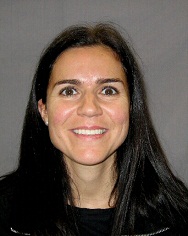Natalia Cernicchiaro
 Professor, Epidemiology
Professor, Epidemiology
Director, Center for Outcomes Research and Epidemiology
DVM - University of Uruguay (2003)
MSc (Epidemiology) - University of Minnesota (2006)
PhD (Epidemiology) - University of Guelph (2010)
Post-doctoral fellow - Kansas State University (2011)
Phone: 785-532 4241
Fax: 785-532 4851
Email
Dr. Cernicchiaro’s lab website.
Research
My primary research focus is on veterinary epidemiology, food safety, zoonoses and production medicine. My research interests include the application of epidemiological concepts and techniques, including multi-level modeling and other statistical methods, to design, implement, analyze and interpret observational and experimental data. I like to integrate the use of core epidemiological and economic approaches to analyze large operational datasets on feedlot cattle health and performance as a way to enhance the practical understanding of cattle health problems. Other research interests include the application of knowledge synthesis and translation techniques as a tool to help practitioners and producers making evidence-based decisions.
Current research projects include:
Interventions for reducing E. coli O157 shedding in feedlot cattle:
Direct-fed microbials (DFM) are probiotics that act by excluding harmful bacteria like E. coli and preventing its colonization in the digestive tract. The objective of this study is to determine whether the administration of a high-dose of DFM (Lactobacillus animalis LA51 and Propionibacterium freudenreichii FP24) is associated with E. coli O157 shedding in feces of cattle in feedlot operations. Along with interventions such as DFMs, supplemental management and dietary control measures would be beneficial when implemented at feedlots, especially during periods of high transmission, for reducing the pathogen load of cattle entering the slaughter plant.
Epidemiology of Shiga toxin-producing Escherichia coli (STEC) in pre- and peri-harvest cattle:
Our group has designed and implemented studies to determine the prevalence and concentration of STEC-7 in commercial feedlot, dairy and cull cattle and their production environments as well as at harvest. In addition, we have determined the applicability of culture- and PCR-based methods, used for isolation and identification of STEC in feces, on hide and carcass samples and validated these diagnostic tests for detection of STEC-7 using field samples.
Investigation of association between antimicrobial use and emergence of antimicrobial resistance in indicator and pathogenic bacteria in feedlot cattle:
Our studies focus on understanding the effects of administration of antimicrobials on the possible emergence and spread of antimicrobial resistance in gut commensals (Enterococcus spp. and Escherichia coli) and foodborne pathogens (Salmonella spp. and Campylobacter spp.) shed in feces of beef cattle.
Use of epidemiological approaches to investigate the risk of emergence of the Japanese encephalitis virus (JEV) in the USA:
In collaboration with the Department of Agriculture, Arthropod-borne Animal Diseases Research Unit (USDA-ARS-ABADRU), we are working on a study that aims to define risk profiles that quantify the distribution of JEV risk in pig, bird, mosquito and human populations and to explore the impact of changes in risk factors or of implementing mitigation strategies in the risk of introduction of JEV in USA.
Epidemiology of Bovine Respiratory Disease Complex (BRDC) in feedlot cattle:
We have applied a variety of analytic tools to quantify the effects of risks factors associated with BRDC health, production, and economics impacts. Currently, I collaborate on a BRDC grant led by Dr. David Renter that seeks to define unique health risk profiles that quantify the distribution of BRDC risks for defined subpopulations of at-risk feeder cattle by using risk analysis and economic models. We expect that our results will have immediate and sustainable impacts on the U.S. beef industry by improving BRDC health and economic risk management as well as disease control strategies.
Invasive Mosquito Project:
I collaborate with Dr. Lee Cohnstaedt, from USDA-ARS-ABADRU, in the design and implementation of data collection tools, and analysis of data, for the invasive mosquito project. The Invasive Mosquito Project (IMP) was launched recently as an initiative that pairs high school teachers and students with mosquito control and public health professionals. This partnered citizen science classroom project helps high school teachers meet national education requirements (next generation science standards), and students learn about mosquitoes, vector-borne zoonotic diseases, public health, and safety. One of the main goals of the project is to transform teachers and students (non-professionals) into citizen scientists. The IMP provides educational materials in the form of lesson plans, PowerPoint® presentations, and protocols for teachers and students, which can be downloaded from the IMP website.
Consulting:
I collaborate with several faculty in different departments within the College and the University, as well as with industry partners and researchers in other Institutions on areas pertaining to study design and implementation, and statistical analyses of observational and experimental data.
Teaching
I coordinate and instruct
- DMP 855 - Disease detection
- Surveillance and Risk Assessment (3 cr.)
- DMP 954 - Advanced Epidemiology (4 cr.).
- These are advanced graduate-level courses focused on understanding and implementing disease detection / surveillance systems and risk assessments suited to a variety of animal health, public health and food safety applications, and to help students develop skills in observational study design, data analysis, and statistical model building as it relates to observational epidemiological studies, respectively. I also mentor graduate students in the MS, PhD and MPH programs, as well as veterinary students in the VRSP program. Moreover, I contribute to teaching international and national courses/seminars in epidemiological topics for veterinary and technical service professionals.
Publications
Pubmed search for Dr. Cernicchiaro.